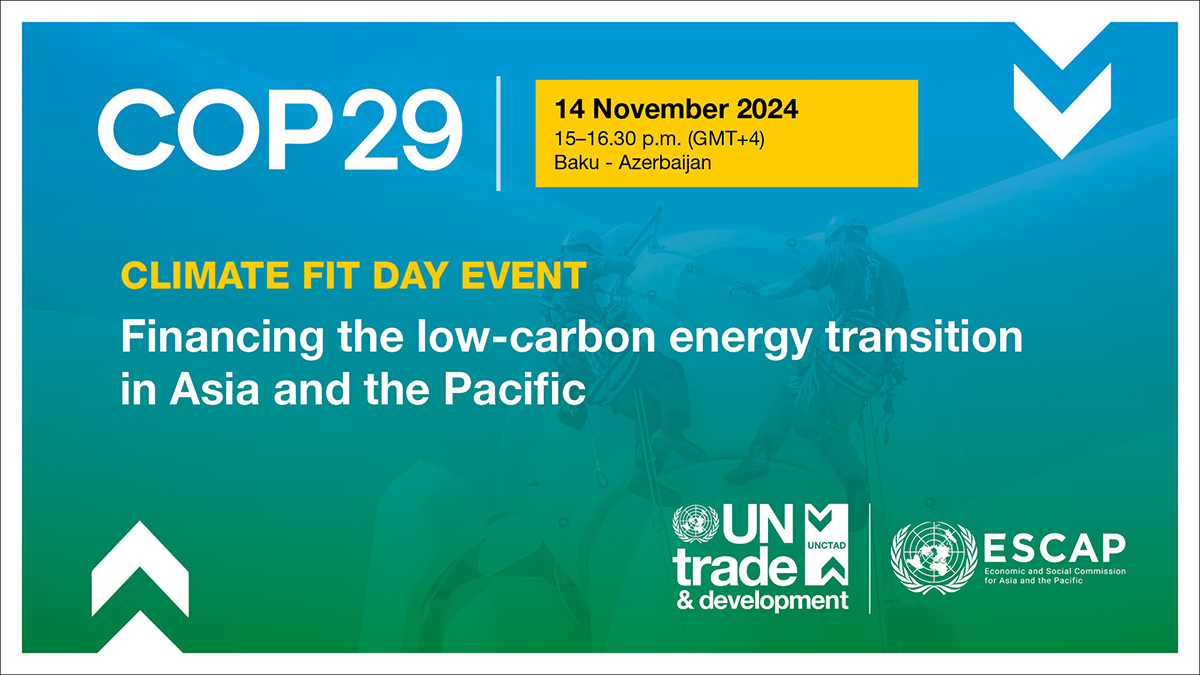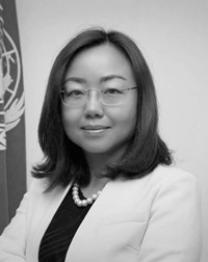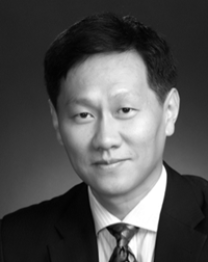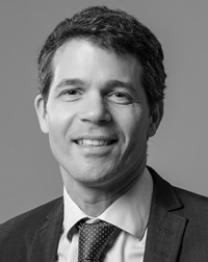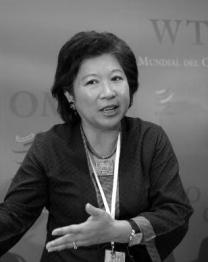Many middle-income countries (MICs) are simultaneously confronted with rapidly growing energy needs and the necessity to respond to the climate crisis, often with limited resources. Many emerging market developing economies (EMDEs) are also deeply exposed to and dependent on fossil fuels, and the shift to a low carbon energy system also implies a transformation of their broader economies, involving significant trade-offs and upfront costs to ultimately deliver future benefits.
How then can EMDEs transition away from fossil fuels in an equitable manner while tripling renewable energy capacity, doubling the rate of energy efficiency, and accelerating zero- and low-emission technologies, including nuclear energy, as ascribed in the UAE consensus?
This event will explore options to reconcile these challenges, with speakers from MIC governments, private finance, public development banks, and industry bringing testimonies from the ground. This townhall in person session seeks to break the “deadlock” that plagues developed and developing states.
Nan has over 25 years’ experience in strategic management roles both with the United Nations and the private sector across Asia, Africa, North America and Europe. She currently leads a global team in investment and sustainable finance research, policy, investment promotion and facilitation, enterprise development, and technical assistance to governments in over 160 countries. She chairs the Governing Board of the UN Sustainable Stock Exchanges Initiative, leads the World Investment Forum and the inter-governmental Working Group on International Standards of Accounting and Reporting.
Before joining UNCTAD, she served as the Global Director of Sustainable Investments and Innovation at UNOPS, where she led a team to promote infrastructure investments in many developing countries and co-invest with DFIs and private investors. She served as UNOPS focal point in the UN Inter-agency Task Force on Financing for Development.
Previously, she served as the Head of UNDP SDG Innovative Finance and as Head of South-South Cooperation and Investment at UNDP's Asia Pacific Center in Bangkok. She led a team to engage public and private investors and developed national policy dialogues and networks on SDG investment, piloted SDG-aligned funds, bonds and projects in multiple countries. She helped to position UNDP as a pioneer in the UN on sustainable investment and innovative finance. She also held positions as Policy Specialist in Capacity Development and Public-Private Partnerships in New York and Johannesburg since 2009, overseeing a regional portfolio in Eastern and Southern Africa.
Before joining UNDP, she spent about 10 years in the private sector in China and the USA, covering market entry and investment strategy, merger and acquisition, business development and sustainability. She holds a master’s degree in business administration from Hong Kong University of Science and Technology, and participated in the Executive Leadership program at IESE, and Finance Executive program at Tsinghua University.
Suba is the Chief of Section of Financing for Development at UN ESCAP, which seeks to accelerate the flow of sustainable finance within the Asia Pacific region, both by sovereigns and by private issuers and investors. Additionally, the Financing for Development section seeks to inform and influence governments and regulators to drive the appropriate enabling frameworks to achieve greater financing for development in the region, with a particular focus on climate, nature, and energy transitions. Before joining ESCAP, Suba was the Head of Private Sector Development/Investment at the economic consultancy Nathan Associates and Programme Manager at UNDP for the “Business Call to Action” programme. She holds a Master in Public Policy from the Harvard Kennedy School and a Bsc in Government and Economics from the London School of Economics.
Mr. Huang Wei is the Director of the Division of Planning, Information and Knowledge Management in the Department of Nuclear Energy (NEPIK), IAEA. Since joining the IAEA in March 2016, Mr. Huang has led the Agency’s activities in capacity building in Member States in energy planning and information and knowledge management. In addition to coordinating joint energy planning initiatives with UNDESA, IRENA and UN Regional Commissions, he has directly contributed to key international events on SDGs and climate change, serving as the organizational focal point to the IPCC and UNFCCC, contributing to the Global SDG7 Conference providing input to the HLPF in 2018 as a moderator and a panellist, and participating in COP 23 and COP 24, among others.
Mr. Huang’s career includes a mix of diplomatic, management and engineering experience, including decades of service in the nuclear industry and government in China, along with diplomatic postings as Deputy of the Permanent Mission of China to the IAEA and Science Attaché in the Chinese Embassy in Washington DC.
Mr. Huang holds a Bachelor Degree in Electrical Engineering and a Master Degree in Nuclear Engineering.
Eric Usher Heads the UN Environment Programme Finance Initiative, UNEP FI, a global partnership bringing together the UN with a global group of banks, insurers and investors working to develop the sustainable finance and responsible investment agendas. Eric oversees governance, strategy and day-to-day management of UNEP FI’s work programme and global network development. Over the years UNEP FI has established some of the most important sustainability oriented frameworks within the finance industry, including the Principles for Responsible Investment (2006), the Principles for Sustainable Insurance (2012) and the Principles for Responsible Banking (2019).
Since joining in 2015, Mr. Usher has focused on accelerating the deep integration of sustainability risks into financial practice, including addressing climate change, natural capital loss and human rights abuses, as well as building out the frameworks for positive impact finance needed to achieve the UN Sustainable Development Goals. Eric sits on several industry bodies including as UN representative on the Board of the Principles for Responsible Investment, and as a member of the governing boards of the Sustainable Stock Exchanges Initiative, the Net-Zero Asset Owner Alliance, the Investor Agenda and the impact fund REPP Africa.
Prior to leading UNEP FI, Mr. Usher has over twenty years of experience in the low carbon sectors, spanning technology commercialisation in Canada, solar rural electrification in Morocco and financial sector development across emerging markets. During 2011, Mr. Usher worked on the establishment of the Green Climate Fund and led efforts to create its Private Sector Facility. Eric has been an editor of the Global Trends in Renewable Energy Investment report published annually with Bloomberg and was lead author for finance of the IPCC Special Report on Renewable Energy Sources. Earlier in his career, Eric was General Manager of a solar rural electrification company based in Morocco.
Karen Fang is Managing Director, Global Head of Sustainable Finance at Bank of America. She works across Bank of America’s eight lines of business to drive the implementation of its firm-wide sustainable finance strategy and goal of mobilizing and deploying $1.5 trillion in sustainable finance capital by 2030.
Karen is a member of the Bank of America’s Management Committee, Responsible Growth (ESG) Committee, as well as the firm-wide Asian Leadership Council. Formerly, she was the head of Global Fixed Income, Currencies & Commodities (FICC) Cross Asset Trading, and the head of Americas FICC Sales & Solutions prior to that.
Karen is a leader in global net zero and sustainable finance task forces, including the G7 Just Energy Transition Partnership, UN Global Investors for Sustainable Development, Sustainable Markets Initiative, World Economic Forum Net Zero Transition Steering Committee, and the U.S. Steering Council of 1t.org, a public-private partnership to advance reforestation and carbon finance initiatives. Karen served as a National Board member of the Local Initiatives Support Corporation (LISC), one of the largest Community Development Financial Institutions in the U.S.
Prior to joining Bank of America, Karen was a Managing Director at Goldman Sachs where she was the head of the Pension, Endowment and Foundation Cross Asset Solutions Group. Previously, she held senior positions in derivatives structuring, including at Merrill Lynch in Tokyo and Deutsche Bank in London.
Karen was named one of Fortune’s “40 under 40”and a Young Global Leader by the World Economic Forum (WEF). Karen is featured as one of Crain’s New York Business’s 2023 Notable Leaders in Sustainability and listed on 2022 Notable Women on Wall Street, and a recipient of the 2021 American Banker Most Powerful Women Standout Award, the 2021 Outstanding 50 Asian Americans in Business Award, and Business Insider’s 100 People Transforming Business Award in 2020. Previously, she was chosen by Investment Dealers’ Digest as one of the “40 under 40” bankers and is also a recipient of the Women’s Bond Club of New York’s Rising Star Award.
Karen holds a bachelor’s degree in economics from the University of Tokyo.
On July 13, 2022, the U.S. Senate confirmed Owen E. Herrnstadt to be a Member of the Board of Directors of the Export-Import Bank of the United States. Mr. Herrnstadt was sworn in on July 15, 2022. Owen Herrnstadt served as the Chief of Staff to the International President and Director of Trade and Globalization, at the International Association of Machinists and Aerospace Workers. As Chief of Staff, he assisted in running one of the largest manufacturing and transportation unions in the world. As Director of Trade and Globalization, he developed policy for international trade, economic investment, international labor standards, and human rights matters.
Mr. Herrnstadt has taught employment and labor law as an adjunct professor at Georgetown University’s National Law Center and international employment and labor law at American University’s Washington College of Law. He is a member of the Council on Foreign Relations and a former member of the U.S. Export-Import Bank Federal Advisory Committee, U.S. State Department Federal Advisory Committee on International Economics, Co-Chair of the State Department’s Stakeholder Advisory Board on OECD Guidelines, Independent Mexico Labor Expert Board and the Industry Trade Advisory Committee 1 (Aerospace). Mr. Herrnstadt has also served as Chair of the Board of Directors of the Baltimore Branch of the Federal Reserve Bank of Richmond. He has made numerous presentations on labor and employment law, international employment and labor law, corporate social responsibility, trade, manufacturing policy, human rights, and industrial relations in the U.S. and abroad.
Mr. Herrnstadt has written numerous articles and has testified before Congress and federal agencies on numerous matters, including labor and employment law, as well as trade and manufacturing policy. He is a Fellow in the College of Labor and Employment Law and served as a Research Associate at the Economic Policy Institute. He has received the Outstanding Practitioner Award and the Practitioner Fellow Award by the Labor and Employment Research Association and the Georgetown University Silver Vicennial Award in recognition of service to the Georgetown community.
Mr. Herrnstadt was born in Ames, Iowa and received his BS, MS (Industrial Relations) and JD degrees from the University of Wisconsin-Madison.

